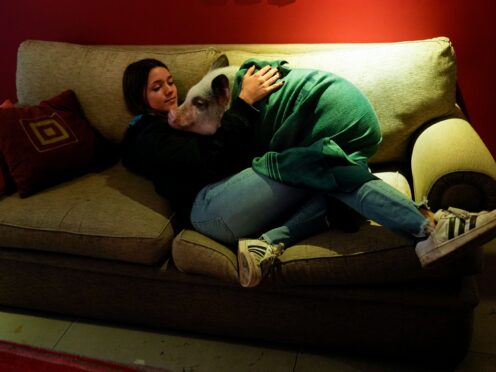Millions of people have found solace during the pandemic in cuddling a dog or cat. For a few, comfort comes from a horse or a pig, perhaps a possum-like sugar glider or even a tarantula.
As the new coronavirus began to circulate last year, Luciana Benetti found her plans for a big traditional 15th birthday party scrapped.
In its place, her parents gave her a pig.
Chanchi turned out to be a loyal and loving companion — racing to her side when she fainted.
“One day my legs gave way and he came running. He grabbed my hair and raised my head,” she said.
She had been taking online classes at home, unable to see friends or schoolmates. “I didn’t feel well. I was dizzy because I couldn’t leave.”
Without Chanchi, “I wouldn’t be me,” said Luciana, who often sleeps alongside the 45-pound Juliana pig.

Even less common is the case of Lorena Alvarez, whose Buenos Aires apartment is also home to 28 pocket-sized marsupials commonly known as sugar gliders.
“They create pure love for me,” she said. “Do you know what it is to lay down… and they smother you with kisses?”
Lorena, who teaches statistics at a university — online these days — lives otherwise alone, but said the pets have helped her feel like she has company. Sometimes they even pop up on her head during Zoom calls.
“I get up and I live for them. They are my engine of struggle and of life,” she said.
The 28 are the result of two she adopted several years ago after getting a permit for the animals.
That sort of multiplication is one reason that many animal rights groups oppose keeping gliders as pets, and why some dealers sell only neutered males.
Argentine veterinarian Adrian Petta, who specialises in unconventional pets, said he’s seen hundreds of animals over the past 18 months of the pandemic — pigs, rabbits, birds, rodents, geckos and the like.
“Many people have felt alone and have sought pets, or they are tired of the television and computers and need more affective relationships,” he said.

That’s the case for Osvaldo Negri, a 50-year-old nurse, who began raising spiders to overcome arachnophobia, and now has 60. He said that caring for them has helped him cope with working at the hospital in the midst of Covid-19.”I concentrate on having to move slowly because if they frighten, they could fall,” he said, holding a colourful and venomous Mexican tarantula in the palm of his hand.

For Solana Pesca, companionship comes with the bright-eyed rats Regue and Brama, who scratch at their cage when the see her enter her small apartment in Buenos Aires.
“They understand what you feel, they seek you out,” said Solana, who works at an animal laboratory.

South of Buenos Aires, in the town of Tandil, 77-year-old Alberto Castro had spent much of his time at the Hogar San Jose, a home for the elderly, sitting in a chair.
That changed in March last year when the home brought in a horse named Coco.
Alberto took to caring for the horse, which arrived in bad shape.
“It changed my life. I care for it, it seeks me out and when I approach, it neighs. As long as I am there, nothing is going to happen to it,” he said.
